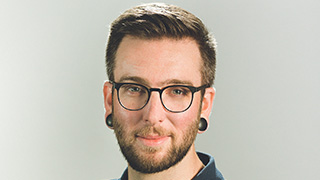Catholic Theological Philosopher Brings Jesuit Lonergan Into The Present
Wednesday, April 30, 2025
Jonathan Heaps, Ph.D.
Heaps has studied and thought about humans’ place in the world alongside God for many years, having earned graduate and terminal degrees from Boston College, Boston University and Marquette University — but describes himself as having been a less-than-spectacular student in his younger years. “I only became someone with any academic ability in college, in part because I fell in love with philosophy,” he said.
At North Park University in Chicago as a philosophy major, Heaps studied evangelical thought, where he found it interesting that all his philosophy professors had completed their doctoral work in Jesuit universities. “I got a very Catholic intellectual tradition,” he said. “And I was already a nerd who liked learning things, but when I encountered philosophy … I didn't know these questions existed. I didn't know you could ask them. Some of them, I didn't even know what they meant, but I found it all very exciting.”
Later, at Boston College in a master’s program, Heaps remained interested in philosophical questions that were relevant to faith and theology but describes himself as having been an “in-between” person: he could not decide if he was more a philosophical thinker or a theological thinker. In his doctoral work at Marquette, Heaps chose to work with a Lonergan scholar who was also a multidisciplinary thinker.
Like his mentor, Heaps was interested in Lonergan and other great minds like Carl Jung and Paul Ricoeur. “Along the way, I pretty thoroughly caught the Lonergan bug,” he notes. Lonergan was, at the time, considered more obscure. A significant figure in 1970s Catholic thought, a Canadian Jesuit and intellectually gifted, Lonergan was called “The Brain” by his classmates.
Heaps expanded on his study of Lonergan’s Latin-language texts – which he reviewed in mimeograph form and in print, written in middle 20th-century scholastic style. Though he found the writing “clunky,” Heaps noted there were profound ideas tucked into the textbooks. “Some were solutions to contemporary theological problems,” he recalled, “but they were hidden in these obscure Latin-language scholastic textbooks that really nobody but specialists like me were going to read.” Heaps’ 2024 book, The Ambiguity of Being: Lonergan and the Problems of the Supernatural (The Catholic University of America Press), brought Lonergan to a contemporary format which nonspecialists could understand.
Raised by a nurse who was the first in her family to get a college education and a journalist who grew up poor in South Los Angeles and attended Stanford, Heaps was exposed early to servant leadership and intellectual tradition. His interest in everyone’s ideas, even children’s, is obvious, and he says some of his most interesting conversations about theology come from the younger set – his kids. A father of three elementary-age children in Catholic school, Heaps loves when the children ask questions about things they have heard in their religion class, like “Does God make mistakes?” or “How big is God?”
Leading the Lonergan Institute gives Heaps a way to reach both typical theology students and those who may consider themselves outliers – as he once did. Candid about his unusual academic trajectory, Heaps hopes that it inspires others to stay the course – and realize it is not linear. “I didn't finish high school. I did the California High School Proficiency Exam and got a certificate of equivalency, went to junior college for a couple of years at 16. I have a Ph.D. and two master’s, but I don't have a high school diploma,” he says.
Now, Heaps is working on a new book for undergraduate students exploring the purpose of the university as an institution, and what it is for, both in teaching and research capacities. He enjoys teaching and exploring human experience with his students. “I hope that students will come away with, if nothing else, a felt sense of the breadth of ways in which people have been human, across cultures and through history.” This, he muses, can be liberating. “I want them to realize that the way people think and speak, and act here and now, is not the sum and substance of your options for being a human being – and that it has looked very different in lots of different times and places. We can decide to live other than the way we're living now, if we want to or need to.”
Categories: Faith and Service






